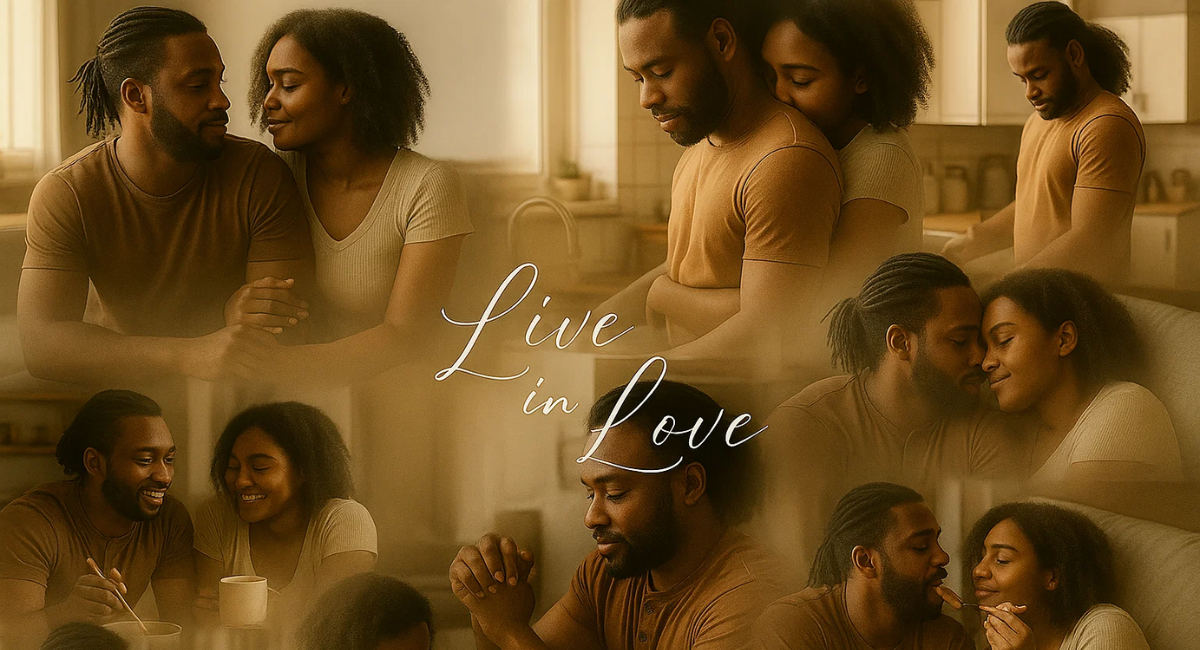Breaking Traditions: The Rise of Live-In Love Across Africa

All across Africa, in the buzz of Lagos traffic, in the evening markets of Nairobi, in the flats of Johannesburg, and even in the soft stillness of rural towns, a quiet shift is happening in the way young people love. It’s not always loud. There’s no ululation, no convoy of cars, no aunties tying wrappers and dancing at sunrise. Instead, there’s something quieter. Two people, choosing each other. No bride price yet. No ceremony. Just love. Just home.
To some, it feels wrong. Like something that needs to be hidden. But for many young Africans, love doesn’t follow the path it used to. It’s not about shame or pride. It’s about learning, unlearning, and living love from the inside out.
This kind of love is messy and beautiful. It’s born in real kitchens, shared basins, one mattress on the floor and not Instagram-ready. It’s not parent-approved. But it’s honest. And slowly, it’s becoming part of how love looks on this continent. So what does live-in love really feel like in Africa? This is the love story they are building, one ordinary day at a time.
Download Pendova on Google Playstore:

iOS Users can access Pendova app on web.pendova.com
1. Evolving Relationship Models
Back then, love was a straight line. You met someone, you dated quietly, you introduced them to your people, the families agreed, and then the process began of dowry, planning, marriage, then finally, moving in.
Today, that line is curving. Many couples are choosing to live together before all that. Not because they don’t value tradition, but because they want to grow love with their eyes open. They’re not just dating anymore. They’re doing laundry together. Fighting about groceries. Learning how to love each other when the lights go out and tempers are short. It’s not rebellion. It’s realism. And it’s happening everywhere.
2. Real-Life Compatibility
The love you experience out there isn’t the same as the one that meets you in your shared living room. When you live together, the romance meets the routine. You finally meet the version of each other that no one else gets to see. The sleepy face, the leftover arguments, the forgotten flush, the small kindness that nobody else notices.
There’s no need to impress anymore. It’s just the unfiltered, everyday you. You are fully there. And so are they. Some couples find that this rawness brings them closer. Others realize they’re not built for each other. But at least now, they’re learning early. Before money, families, and expectations get involved.
3. Modern Love Values
Love today isn’t tied to who earns or who cooks. It’s about care. and about, “Did you remember to buy her pads?” or “Did you leave him the last piece of chicken?” In many live-in relationships, the love language is in the little things. It’s folding each other’s laundry. Knowing when to just sit quietly beside them. Doing little acts of thoughtfulness without being told. It’s not about gender roles. and about emotional maturity. It’s about giving, receiving, adjusting. Building habits of care that last longer than flowers.
4. Intimacy Without Labels
Not everyone who lives together wants to rush into marriage. And that’s okay. Sometimes love needs to grow outside the pressure of ceremonies, outside the opinions of extended family. Sometimes you just want a home, a safe place to figure each other out. A place where you can fall apart and still be held. This kind of intimacy doesn’t always come with titles. But it carries weight. And in many cases, it carries more truth than some relationships with rings.
5. Cultural Pushback
This is the hard part. Parents who feel disappointed. Community aunties who ask too many questions. Religious leaders who preach indirectly about your “living in sin.” People whisper. They assume. They judge. Sometimes they cut you off.
And yet, even with the shame, some couples keep choosing each other. Because this love makes sense to them. Because they’d rather build something quiet and true than perform something loud and empty. Some families soften, eventually. Some don’t. But love grows anyway.
6. Shared Economic Pressures
Rent in African cities will humble you. It eats into your savings before you even know it. Food costs money. So does transport. And even keeping the lights on feels like a monthly battle. So for many couples, living together begins as a decision of survival. Two salaries stretch further than one. One fridge, one gas cylinder, one home.
But slowly, that survival starts to feel like partnership. It becomes shared lists, shared plans, shared sacrifices. You start thinking together. You build small dreams: a better mattress, a new curtain, maybe a baby one day. It becomes more than just about bills. It becomes about building.
7. Emotional Exposure
There’s no makeup when you’re crying on the kitchen floor. No nice outfit when you haven’t bathed all day because life just feels too heavy. Living together makes you visible. Raw. Fully known.
You learn how to sit with someone’s sadness. How to love them even when they’re not loveable. You learn how to be soft, even in your anger. It’s not always romantic. But it’s real. And for many, it’s the first time they’ve ever felt fully seen.
8. Fragile Legal Standing
Here’s the painful truth: if your partner leaves, the law might not protect you. You might have shared years, a home, bills, even children. You could build a whole life together, but without papers, it holds no weight in the eyes of the law. No property rights. No legal claims. Sometimes, no justice.
Many people, especially women, are vulnerable in these setups. And while more voices are asking for legal changes, the system is still slow. Still, people keep loving. Hoping that what they’re building will hold.
9. Urban Versus Rural Divide
In the cities, you can get away with more. There’s privacy. People mind their business. You can live your life quietly. But in the villages, it’s different. Everyone knows everything. People watch, talk, question. The rules are stricter. The pressure heavier.
Even in the most conservative corners, there are those who quietly choose love on their own terms. Couples living quietly. People choosing their own path. It’s not always loud, but it’s happening. Love is shifting even where it’s not allowed to.
10. Growing Love
At the end of it all, this kind of love is still love. It might not have a wedding album. It might not come with applause. But it lives in the details. In how you learn someone’s rhythm. and how you know when they need space. In how you fall asleep next to them, feeling safe even on days you don’t talk much. It’s a love that’s growing. Maybe toward marriage. Maybe not. But it’s real. And for many, that’s enough.
Final Thought
Live-in love in Africa may still be misunderstood, but it’s real. They’re not turning their backs on tradition. They’re just finding a way that feels true to them. It’s about making love feel lived, not just performed. It’s about two people, choosing each other without needing a crowd to clap for them.
In quiet flats and simple rooms, across the continent, something beautiful is growing. Not perfect. Not polished. But true. And in a world full of noise and judgment, maybe that quiet kind of love, soft, steady, and unashamed, is the most radical thing of all. That, too, is African love. The kind you live in.
Follow our Social Medias:







